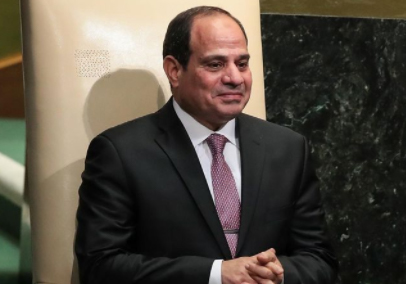
Jun 11, 2018
The ICJ today called on the Egyptian authorities to ensure that the framework on the state of emergency is comprehensively reformed consistent with the country’s international human rights obligations.
The ICJ is particularly concerned that Egypt seems to be returning to the continuous and permanent state of emergency that prevailed in Egypt, uninterrupted, from 1981 until 2012, and that resulted in grave and systematic human rights violations.
Since April 2017, President El- Sisi (photo) declared the state of emergency, renewed it, and then declared a new state of emergency five consecutive times.
“In declaring and renewing exceptional measures under the state of emergency, Egypt has consistently failed to demonstrate that the situation ‘threatens the life of the nation’, the threshold for such measures under international law,” said Said Benarbia, ICJ MENA Director.
Egypt has also failed to set out clear and precise conditions in which the President is allowed to declare the state of emergency and in which measures derogating from human rights under the state of emergency can be declared, the ICJ says.
It has also failed to ensure that each such measure is strictly limited and proportionate to the exigencies of the specific emergency, specify which rights can or cannot be subject to derogation, and notify relevant stakeholders of such derogations, the Geneva-based organization adds.
“Repealing or amending emergency measures to ensure they are limited in time and scope and are not used to curtail rights or to crush dissent, is a prerequisite to establishing and upholding the rule of law in Egypt,” added Benarbia.
The ICJ’s findings and recommendations are based on a position paper published today, in which the ICJ analyses the framework on the state of emergency and assesses its impact on certain aspects of the administration of justice, including those relating to the use of emergency state security courts and to the right to liberty and to fair trial.
Under the framework of the state of emergency, Prime Minister Sherif Ismail issued a decree on No. 2165/2017 through which numerous crimes, including those related to protest, assembly, terrorism and labour law have been placed under the jurisdiction of the emergency state security courts.
These courts have mainly been used to try students, human rights defenders, political activists, union members and those suspected of opposing the government in proceedings that fall short of international standards on fair trial.
“Authorities must abolish the emergency state security courts and ensure that any existing proceedings before them should be either nullified or transferred to the ordinary courts,” said Benarbia.
Contact
Said Benarbia, Director of ICJ’s Middle East and North Africa Programme, t: +41-22-979-3817 ; e: said.benarbia(a)icj.org
Egypt-Return to State of Emergency-Advocacy-Analysis brief-2018-ENG (full memo in English, PDF)
Egypt-State of emergency-News-Press releases-2018-ARA (full story in Arabic, PDF)
Egypt-Return-State-of-Emergency-Advocacy-Analysis-brief-2018-ARA (full memo in Arabic, PDF)
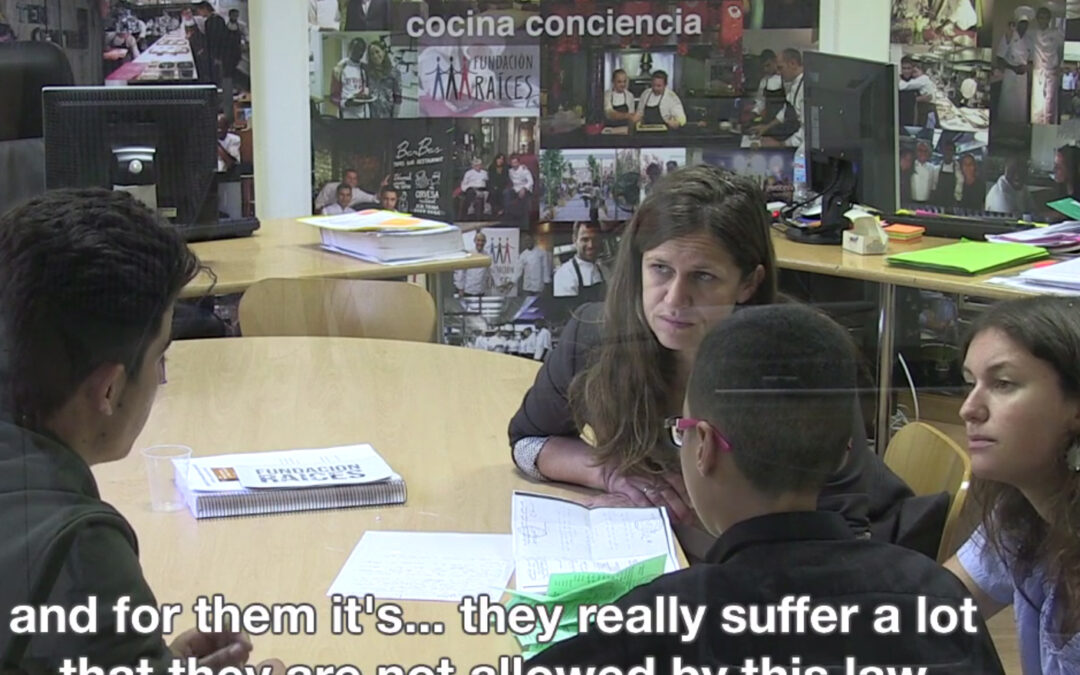
May 16, 2018 | Eventos, Noticias
Entre 2016 y 2018, la CIJ – Instituciones Europeas junto a organizaciones colaboradoras en siete países de la Unión Europea (UE), trabajó en el acceso a la justicia de niños migrantes en el contexto del proyecto FAIR (Promoviendo Acceso a los derechos de los niños migrantes).
Los niños migrantes en la UE hacen frente a violaciones de sus derechos humanos a diario.
Algunos ejemplos de lo que sufren los menores son: falta de acceso a sus familias, información, tutores y asistencia legal, falta de acceso a una vivienda o al sistema educativo y detenciones ilegales.
El objetivo del proyecto era mejorar el acceso a la justicia de los menores migrantes estableciendo un grupo de abogados europeos que están capacitados para representar niños migrantes en procedimientos nacionales y en el plano internacional.
Durante este proyecto, la CIJ – Instituciones Europeas:
- Desarrolló 7 módulos de capacitación sobre el acceso a la justicia para niños migrantes;
- Formó a 142 abogados de 7 países de la Unión Europea;
- Reunió a 35 abogados y expertos en un evento de 5 días sobre litigación estratégica.
- Creó una red internacional de abogados; y
- Proporcionó apoyo continuo a los abogados en su litigios en representación de niños migrantes.
El proyecto FAIR fue co-financiado por el Programa de Derechos, Igualdad y Ciudadanía de la Unión Europea y OSIFE.
Los módulos de capacitación traducidos en inglés, español, griego, búlgaro, italiano y alemán, estarán disponibles próximamente.
Puede ver un vídeo sobre proyecto FAIR aquí:
Puede ver un vídeo sobre el evanto en litigación estratégica aquí:
Los 7 módulos de capacitación sobre el acceso a la justicia para niños migrantes en Español
Europe-FAIR module 0-Training modules-2018-SPA
Europe-FAIR module 1-Training modules-2018-SPA
Europe-FAIR module 2-Training modules-2018-SPA
Europe-FAIR module 3-Training modules-2018-SPA
Europe-FAIR module 4-Training modules-2018-SPA
Europe-FAIR module 5-Training modules-2018-SPA
Europe-FAIR module 6-Training modules-2018-SPA
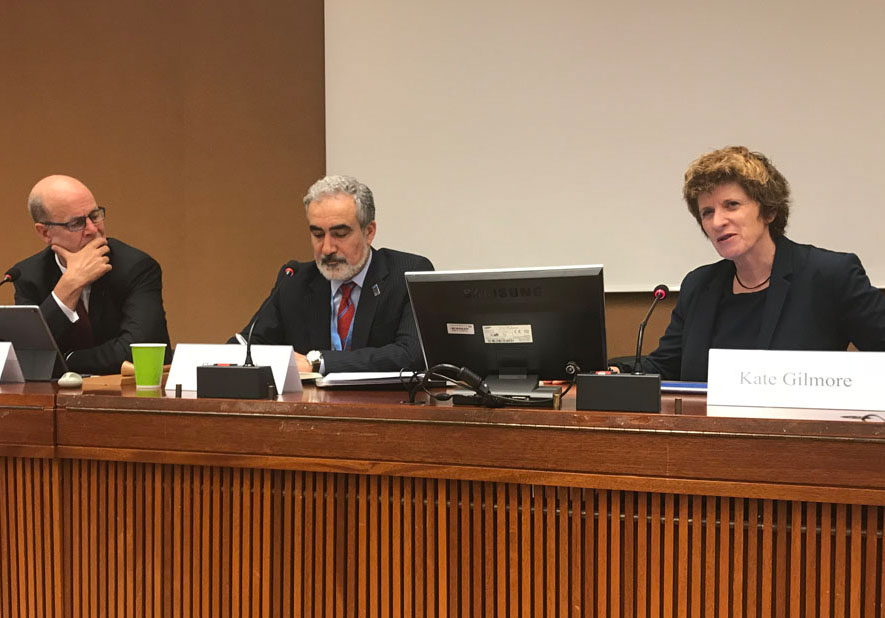
May 3, 2018 | Feature articles, News
On 3 and 4 May 2018, the ICJ supported by UNAIDS and OHCHR convened an expert meeting on global principles addressing criminalization’s detrimental impact in the areas of sexuality, reproduction, drug use and HIV.
The expert meeting of leading jurists from around the globe aimed at laying the foundations for a set of principles to address the misuse and abuse of the criminal law and its detrimental impact on health, equality and human rights.
The expert group focused on the criminalization of conduct relating to four principal areas: sexuality, reproduction, personal drug use, and the overly broad criminalization of HIV exposure, transmission and non-disclosure.
In these areas, international human rights authorities, as well as domestic courts, have regularly found criminal law provisions to be contrary to international law and standards, and to have a deleterious effect on public health.
“We need to understand why the blunt instrument of the criminal law is used against and affects real people, and why the criminal law ought not to apply in our four areas of concern. Where the criminal law is misused, that is a betrayal of the rule of law. The rule of law must be our guiding compass,” said Justice Cameron, Constitutional Court of South Africa.
“The principles we hope to develop must facilitate the availability of tools which can impact key populations where they are in conflict with the law. They are often at risk of blackmail, stigma and discrimination. It falls on courts to make the difficult decisions. Judges can then consider legality, legitimate purpose and questions of necessity and proportionality in light of a broader understanding of the human rights principles at stake and the relevant scientific evidence,” said Judge Mbaru, Industrial Court of Kenya.
“The law is required to guarantee rights but at same time it can impose arbitrary restrictions. Often those restrictions in the form of the criminal law purport to be necessary in order to ‘protect’ people. That purported purpose ought to be closely scrutinised,” said Justice Ortiz, Constitutional Court of Columbia.
Sam Zarifi, Secretary General of the ICJ, stated: “The misuse of the criminal law affects the most marginalized groups of people and, in particular, the dispossessed and disenfranchised.”
“The centrality of the rule of law at a time when it is under threat globally, and our crucial obligation to stand against laws that are arbitrary, unequal and discriminatory,” he added.
Tim Martineau, Acting Deputy Executive Director of UNAIDS said: “The application of human rights principles to criminal law is key in order to address the detrimental impact of such laws in the areas of sexuality, reproduction, drug use and HIV.”
“While there was significant progress in HIV prevention, treatment and care, there was a big discrepancy in HIV prevention in relation to key populations who are more vulnerable to HIV infection in many respects because of a lack of legal protection, and the unjust criminalization of their behaviour,” he added.
Kate Gilmore, Deputy High Commissioner for Human Rights, stated that the criminal law can readily become a tool of repression or oppression. She said: “Wrongful deployment of criminal law betrays universal human rights standards. By eroding rather than protecting physical and mental integrity specifically in the contexts of sexuality, reproduction and gender identity, misuse of criminal law seeks a wrongful “regulation” of the body of women in particular, with devastating consequences for women’s and girls’ autonomy, health and well being.”
She emphasized that “the criminal law plays an essential role in the recognition, protection and enforcement of rights including by tackling impunity for violations for those rights.”
ICJ, UNAIDS and OHCHR consider that the envisaged principles will help legislators, judges and advocates in the development and review of criminal laws that have adverse consequences on health, equality and human rights particularly where they relate to key populations.
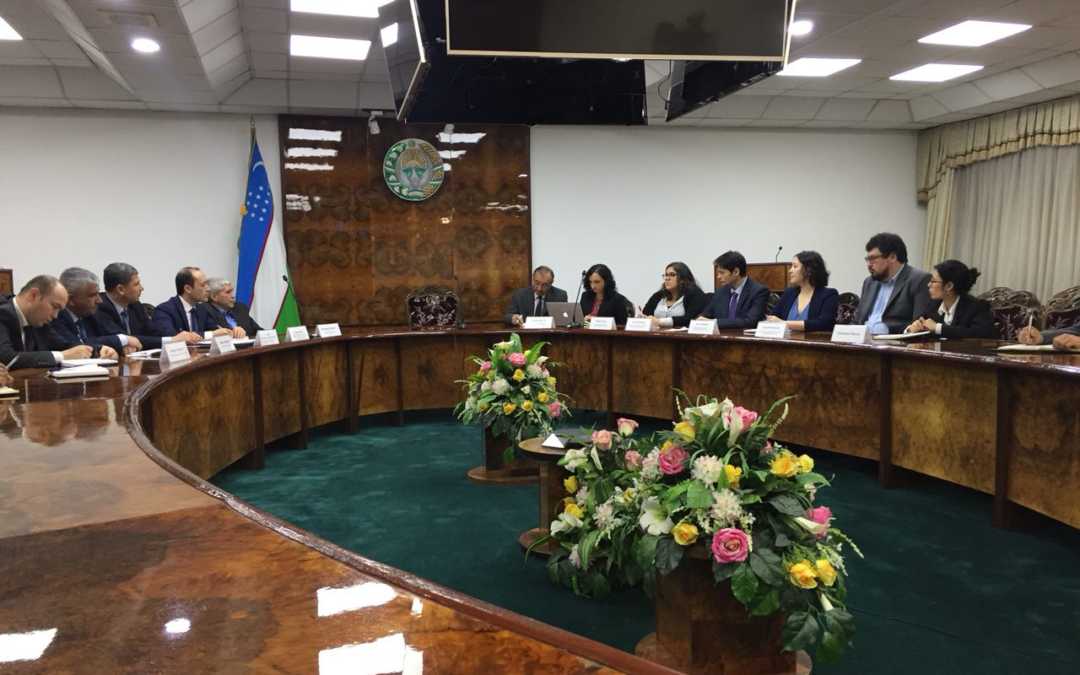
Apr 17, 2018 | News
From April 16 to 20, the ICJ is conducting a research mission to Uzbekistan to identify the priority ESC rights issues which will be the focus of its project on access to the economic, social and cultural (ESC) rights (ACCESS project).
During the mission, ICJ experts will meet with key stakeholders, including relevant State bodies, CSOs, legal experts, international organizations in Uzbekistan and other actors to discuss legal and practical aspects of ensuring access to justice for ESC rights.
During the meetings, among others, the following issues will be addressed:
- current legislation ensuring ESC rights in Uzbekistan;
- ongoing and planned reforms in ensuring ESC rights;
- legal protection of ESC rights and barriers to their enjoyment;
- discussion of possible legal, practical aspects related to access to justice in the field of ESC rights.
The ICJ will rely on international standards in the area of ESC rights, in particular, the International Covenant on Economic, Social and Cultural Rights (ICESCR), to which Uzbekistan is a party.
The results of the mission will form a baseline report which will inform the construction and implementation of the ACCESS project.
The ICJ appreciates the facilitation of the Government and of the European Union, which supports the project, in arranging meetings with relevant State institutions.
Contact:
Temur Shakirov, temur.shakirov@icj.org
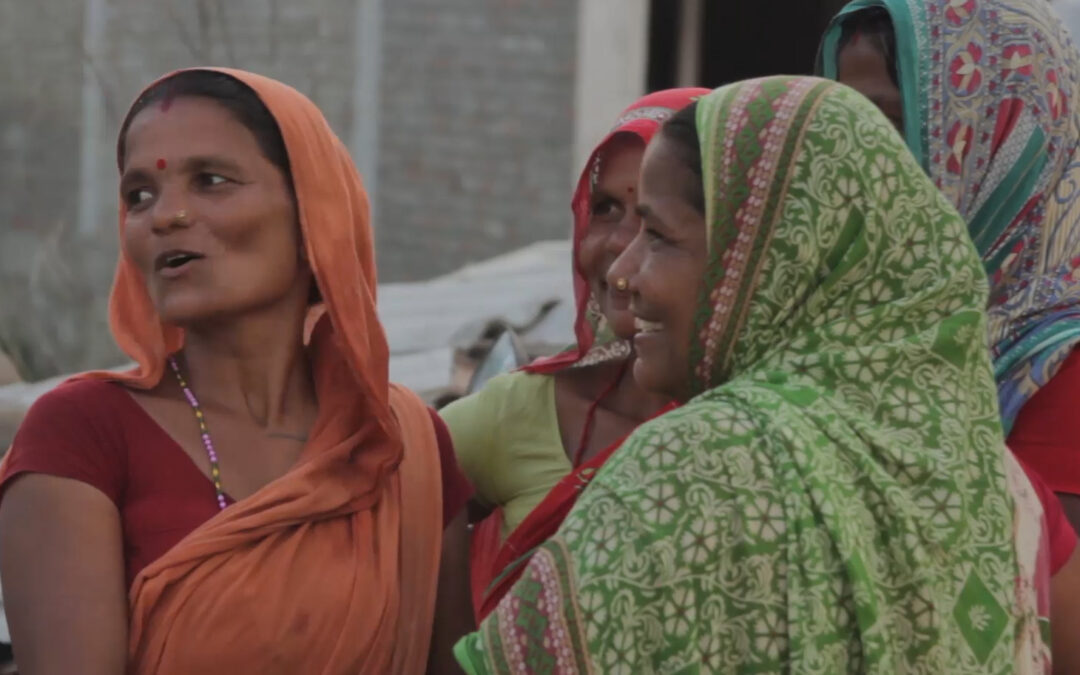
Apr 13, 2018 | Multimedia items, News, Video clips
In 2017, Nepal held its first local-level elections for almost 20 years and the first ever conducted under the new federal state structure established under the 2015 Constitution. They were significant because of the unprecedented number of women who stood as candidates and won.
Women in Nepal have experienced systemic discrimination for decades, especially those in rural areas, among ethnic minorities and marginalized groups.
These elections presented the women of Nepal with the opportunity to break through barriers that have prevented them for decades from participating in political and public life.
The Local Level Governance Act lays out the mandate and functions of newly formed local bodies.
If the recently elected women are allowed to meaningfully participate in local governance, the new law could empower them further so that they can take the lead in addressing key human rights issues, especially the human rights of women.
This video documents the campaign of Rikam BK, a Nepalese politician, belonging to the Communist party of Nepal-Maoist (CPN-M).
In the Nepal Legislative Election held on 26 November 2017, she was elected as a Sub-Mayor (NCP Maoist) of Lahan Municipal Council winning 5000 votes.
She is the chairperson of the Dalit Preservation Abhiyan Forum, in Siraha. She has been advocating the issue of land certificates in the names of both husband and wife.
She continues to call for those deprived of land rights to have equal access to land. She is also the member of National Alliance for Women Human Rights Defenders (NAWHRD).
Many of the women featured in this video are women human rights defenders who have been working to promote and protect human rights in Nepal for decades.
Many of them participated in the Regional Conference on Women Human Rights Defenders as Political Actors, which was organized by the ICJ, with the cooperation of NAWHRD.
The conference was held from 28 to 29 August 2017 in Kathmandu.
The ICJ recently released a briefing paper laying out the key points of the conference and offering a set of future actions aimed at supporting WHRDs in their role as political actors pursuing a human rights agenda.
Watch the video









